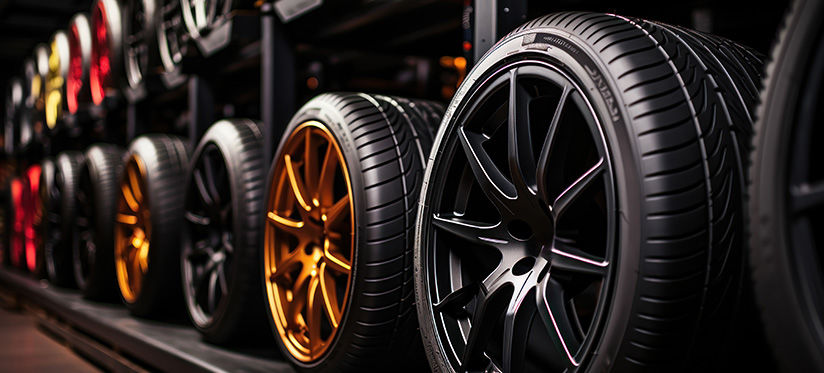
When it comes to upgrading your vehicle's wheels, you're often presented with a choice between alloy wheels and aluminum wheels. While these terms are sometimes used interchangeably, they actually refer to distinct wheel materials with their own set of characteristics, advantages, and considerations. In this comprehensive guide, we'll unravel the differences between alloy wheels and aluminum wheels, dispelling common misconceptions and helping you make an informed decision for your vehicle.
What are Alloy Wheels?
Alloy wheels are wheels made from a blend of different metals, typically aluminum combined with other elements such as magnesium or nickel. This alloying process enhances the strength, durability, and performance characteristics of the wheels compared to traditional steel wheels.
Explore these Bajaj Platina Alloy Bike Tyres.
Features of Alloy Wheels
Lightweight Construction:
Alloy wheels are lighter than steel wheels, which can improve handling, fuel efficiency, and overall performance.
Aesthetic Variety:
These wheels come in a wide range of designs, finishes, and colors, allowing for customization and personalization of your vehicle's appearance.
Corrosion Resistance:
Many alloy wheels are treated with coatings or finishes that offer superior resistance to rust and corrosion, prolonging their lifespan.
Enhanced Performance:
Alloy wheels provide better heat conduction and dissipation, improving braking performance and reducing the risk of brake fade.
Advantages of Alloy Wheels
Improved Performance:
The lightweight construction of alloy wheels enhances handling, steering response, and fuel efficiency.
Aesthetic Customization:
Alloy wheels offer a wide range of designs and finishes, allowing for a personalized and stylish look for your vehicle.
Corrosion Resistance:
Many alloy wheels are treated with coatings or finishes that offer superior resistance to rust and corrosion, prolonging their lifespan.
Heat Dissipation:
Alloy wheels dissipate heat more effectively than steel wheels, which can improve braking performance and reduce the risk of overheating.
What are Aluminum Wheels?
Aluminum wheels are wheels made entirely from aluminum, without the addition of other alloying elements. While aluminum is a lightweight metal, it is not as strong as alloyed metals, making aluminum wheels less robust and durable compared to alloy wheels.
Features of Aluminum Wheels
Lightweight Construction:
Aluminum wheels are lightweight, similar to alloy wheels, which can improve handling and fuel efficiency.
Limited Design Options:
Compared to alloy wheels, aluminum wheels offer fewer design options and finishes, often with a simpler appearance.
Corrosion Resistance:
Aluminum wheels have natural corrosion resistance, but they may still be susceptible to pitting and oxidation over time, especially in harsh environments.
Lower Cost:
Aluminum wheels are typically less expensive than alloy wheels due to their simpler construction and fewer customization options.
Advantages of Aluminum Wheels
Lightweight:
Aluminum wheels offer similar weight-saving benefits as alloy wheels, improving handling and fuel efficiency.
Cost-Effective:
Aluminum wheels are generally less expensive than alloy wheels, making them a budget-friendly option for vehicle owners.
Corrosion Resistance:
Aluminum wheels have natural corrosion resistance, although they may require periodic cleaning and maintenance to prevent pitting and oxidation.
Comparing Alloy Wheels and Aluminum Wheels
1. Composition:
Alloy Wheels: Made from a blend of different metals, typically aluminum combined with other elements.
Aluminum Wheels: Made entirely from aluminum without additional alloying elements.
2. Strength and Durability:
Alloy Wheels: Generally stronger and more durable than aluminum wheels due to the alloying process.
Aluminum Wheels: Less robust and durable compared to alloy wheels, more susceptible to damage.
3. Design Options:
Alloy Wheels: Offer a wide range of designs, finishes, and colors, allowing for customization and personalization.
Aluminum Wheels: Offer fewer design options and finishes, often with a simpler appearance.
4. Corrosion Resistance:
Alloy Wheels: Treated with coatings or finishes for superior resistance to rust and corrosion.
Aluminum Wheels: Have natural corrosion resistance but may still be susceptible to pitting and oxidation over time.
5. Cost:
Alloy Wheels: Generally more expensive than aluminum wheels due to their enhanced performance characteristics and customization options.
Aluminum Wheels: Less expensive than alloy wheels, making them a cost-effective option for budget-conscious vehicle owners.
Are Alloy and Aluminum Wheels the Same?
While alloy and aluminum wheels are both lightweight wheel options, they are not the same. Alloy wheels are made from a blend of different metals, including aluminum, while aluminum wheels are made entirely from aluminum without additional alloying elements. Alloy wheels offer enhanced strength, durability, and customization options compared to aluminum wheels.
Which is Better: Alloy or Aluminum Wheels?
The choice between alloy and aluminum wheels ultimately depends on your priorities, budget, and driving preferences. Alloy wheels offer superior performance, durability, and customization options, making them ideal for drivers seeking enhanced handling and aesthetics. However, aluminum wheels provide a cost-effective option for budget-conscious vehicle owners, offering lightweight construction and corrosion resistance at a lower price point.
You should also read: OEM vs. Aftermarket Wheels: Choosing the Right Option for Your Car
In Conclusion
Alloy wheels and aluminum wheels are distinct wheel materials with their own set of characteristics and advantages. Alloy wheels offer superior strength, durability, and customization options, making them a popular choice for drivers seeking enhanced performance and aesthetics. On the other hand, aluminum wheels provide a cost-effective option with lightweight construction and natural corrosion resistance, ideal for budget-conscious vehicle owners.
Consider your priorities, budget, and driving needs when choosing between alloy and aluminum wheels for your vehicle. Whether you opt for the enhanced performance and aesthetics of alloy wheels or the cost-effective simplicity of aluminum wheels, both options offer reliable and efficient wheel solutions for your vehicle. Select wisely, and enjoy the enhanced driving experience that matches your preferences on the road ahead.

